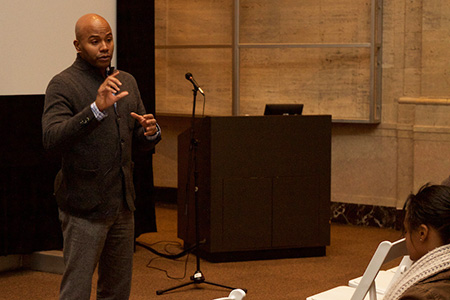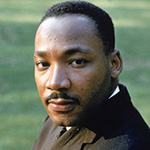Joseph ties MLK memory to Ferguson

Peniel Joseph, a Tufts University history professor, speaks with Emerson students about how Martin Luther King Jr.’s legacy ties into racial equality movements today. (Photo by Nick Eaton ’17)
Tufts University History Professor Peniel Joseph joined the Emerson College community on January 29 at the Bordy Theater for a talk on correlations between past and current black movements and an explanation of why civil rights leader Dr. Martin Luther King Jr. should be remembered as revolutionary.
 Joseph said early in the conversation that one of the interesting things about Ferguson and other tragedies leading up to it is that “it’s the first time the younger generation” has really seen “these issues of race, racism, police brutality, and state-sanctioned violence.” In comparison to the civil rights generation, who grew up in an intensely racist and oppressive society, millennials are just now bearing witness to these societal issues.
Joseph said early in the conversation that one of the interesting things about Ferguson and other tragedies leading up to it is that “it’s the first time the younger generation” has really seen “these issues of race, racism, police brutality, and state-sanctioned violence.” In comparison to the civil rights generation, who grew up in an intensely racist and oppressive society, millennials are just now bearing witness to these societal issues.
With current college students now at the forefront of the protests, Joseph expressed concerns about how King’s legacy has been memorialized in today’s narrative.
While King was a flawed man — as portrayed in most recent films such as Selma — “he was a fierce political organizer and he’s someone that was willing to speak truth to power.”
King’s ability to mobilize groups of people and bring attention to injustice is one of the reasons Joseph considers him a global revolutionary.
“He was advocating revolutionary nonviolence,” Joseph said.
In relation to the ongoing Ferguson and Black Lives Matter movement, while the time frames are different, statistics show that there are still numerous injustices. “History might not echo but it rhymes,” Joseph said.
“Black people are 22% below the poverty line,” he said.

Peniel Joseph speaks with students in the Bordy Theater on January 29. (Photo by Nick Eaton ’17)
Joseph also said how the criminal justice system has continued to profit from “black and brown bodies.” He said there is truly no progress in a society where black people are still struggling the most. Yet, he insists that although this is not the society King would have envisioned, we must remember King for his revolutionary actions in social movements.
According to Joseph, King provided a “combative hope,” and the atrocities of America are a reflection of its own values.
“While we have people like Obama, Oprah, Jay-Z, and everybody wants to clap, we have more poverty than we have ever had before,” Joseph said.
This event was sponsored by the Institute of Liberal Arts and Interdisciplinary Studies.
Categories